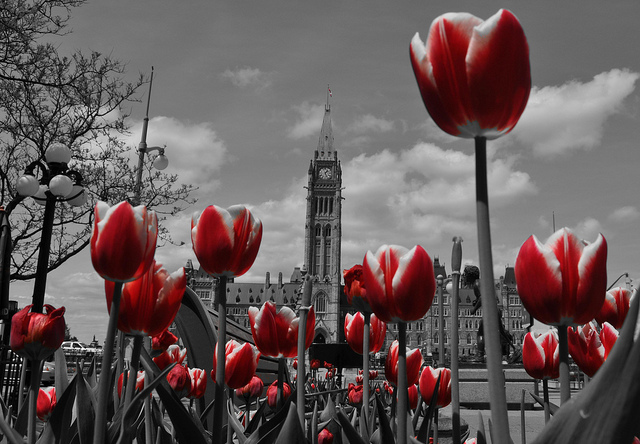A recent panel discussion on Muslim youth radicalization was remarkable both for its insistence on probing causes and its conclusion that fixing the problem is a responsibility shared by all Canadians.
National security and the need to safeguard civil liberties in the wake of the violence in Quebec and Ottawa have focused attention on the extreme views of some young Canadian Muslims.
Afnan Khan, an 18-year-old youth member of the Muslim Coordinating Council of the National Capital Region, organized and moderated this panel where both community leaders and representatives of local law enforcement — the RCMP and Public Safety Canada — met at the University of Ottawa Alumni Auditorium to a crowd of mostly Muslims.
Khan started by confiding that he went through his own extremist phase around the age of 12, but when he was exposed to different interpretations of Islam, he realized “the extremism was ridiculous… this ideology tries to suppress human nature.”
He convened the panel in the hope that from honest dialogue would emerge practical solutions.
Among the panelists was Angus Smith of Public Safety Canada, who noted “these forums are so important” as well as Dr. Tasleem Budhwani, a research analyst and civilian member of the RCMP.
“It’s imperative to build resilience,” Dr. Budhwani said, “to cope with the scourge of racism affecting Muslims since the declaration of the war on terror.”
Members of the Ottawa Police Service also joined the conversation.
Hamid Moussa, coordinator of Community Development, reported that Muslim leaders were creating safe spaces for youth, but had pulled back because of negative perceptions after 9/11. He suggested faith leaders share their plans to engage youth with police resources to tackle the “tough questions like discrimination and Islamophobia.”
His colleague Staff Sergeant David Zackrias of Diversity and Race Relations concurred. “Imams are not solely responsible for preventing radicalization,” he says, nor does it “happen overnight. It’s a pathway, so look at the root causes. Isolation, alienation, vulnerability, the internet — all are contributing factors.”
Imam Mohammed Jebara spoke of ideas that become dangerous over time, citing the Nazi message that when put into practice lead to state directed mass murder. Sharif Awad of the Muslim Association of Canada agreed, noting that “ISIS is great at dehumanization.”
Khan believes that imams with their influence could be instruments of positive change. Others cautioned that imams are not free agents, but are accountable to their employers, the mosque administration.
Paul Dewar, Official Opposition Critic for Foreign Affairs, attended and was impressed with Khan’s initiative.
Interviewed a few days later, Dewar noted however that not one panelist actually defined the scope of radicalization. He also cited the September UN Security Council meeting on ISIS, which concluded with the unanimous adoption of resolution 2178. Along with security measures, the resolution calls for governments to examine the proliferation of extremist ideology and devise domestic policies of civic inclusion to counter it. Instead, he says, Foreign Affairs Minister John Baird has chosen so far only to strengthen the powers of CSIS.
Further, he noted that the O’Connor Report into the Arar case specifically called for more civilian oversight of security agencies, which, to date, the government has failed to implement.
Within the Liberal caucus, MP Wayne Easter shadows the Public Safety Minister. Unable to attend the panel, he spoke by phone from PEI to reiterate that “it’s not a Muslim problem, it’s a Canadian problem… we can’t shy away from the term ‘root causes’ because [we] can’t solve a problem without knowing what the problem is.”
Asked for solutions, the panelists agreed that a comprehensive approach is needed.
Iman Ibrahim works in conflict resolution. She emphasized prevention including dialogue within families, between families and imams, as well as interfaith discussion. Consultation is key. But to succeed, she asserts, Muslim leaders and youth must be at the forefront when planning policy.
Dr. Budhwani stressed that the role of the RCMP is to uphold the law when a crime is committed, but introduced the concept of cross-country community hubs that are led by social service agencies to help vulnerable individuals and families before criminal activity occurs.
Jebara advocated for open societies citing the Abbasid era when freedom of speech strengthened Muslim civilization.
Both MPs agree with this perspective. “Now is the time to be bold. Let’s not revert to fear. Let’s do the opposite and strengthen our civil liberties,” said Dewar.
“Dissenting opinion is important… we can’t have freedom of speech unless there’s freedom of speech for all,” maintained Easter.
The consensus was that this is not a Muslim problem.
The parting message from Staff Sergeant Zackrias? “At the end of the day, we’re all in this together.”
Ferrukh Faruqui is an Ottawa-based physician, writer and community activist. She believes that open expression is the key to a healthy society and recently launched Literary Salon, a forum for ideas and debate to examine contemporary questions facing Canadians. The next Literary Salon event entitled Books and Biryani on December 7 features author Monia Mazigh who will discuss her novel Mirrors and Mirages.
Photo: flickr/jaliyaj



